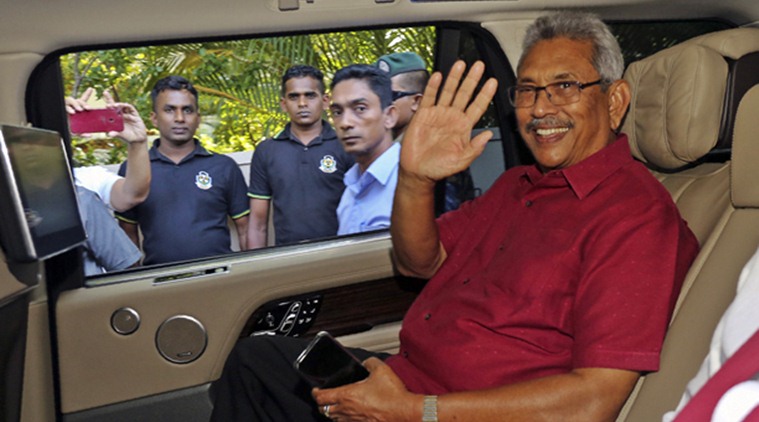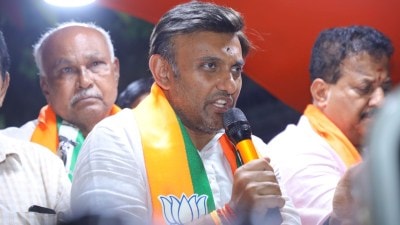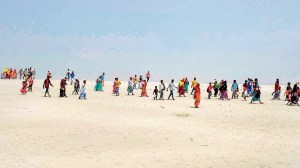- India
- International
View From The Neighbourhood: Sri Lanka polls
The Sri Lankan Press, of course, has been following the election closely, and almost exclusively. And, as is the case in India, it is likely that the drama and euphoria of the change of guard in Colombo will be the subject of editorials and opinion articles for some time to come.
 Colombo: Sri Lanka’s former Defense Secretary Gotabaya Rajapaksa won the presidential elections. (AP/PTI)
Colombo: Sri Lanka’s former Defense Secretary Gotabaya Rajapaksa won the presidential elections. (AP/PTI)
On Sunday afternoon, Prime Minister Narendra Modi congratulated Sri Lanka’s president-elect Gotabaya Rajapakse on his victory. Rajapakse, brother of former president Mahinda, is known for his hardline outlook during the civil war in the country.
The Sri Lankan Press, of course, has been following the election closely, and almost exclusively. And, as is the case in India, it is likely that the drama and euphoria of the change of guard in Colombo will be the subject of editorials and opinion articles for some time to come.
On November 15, however, as the campaign was winding down, the press in Sri Lanka was critical of the principal political players. In its editorial, The Island remarked on the tall promises that political parties make while campaigning: “Perhaps, the only thing the presidential candidates did not promise us, during the last few weeks, was rice from the moon or handen haal. They pledged to give us virtually everything else free of charge so much so that one may have wondered whether they had found Aladdin’s magic lamp. Fulfilling all these promises is a task that only Sakka or the King of Gods may be equal to, given the huge amount of funds and the superhuman effort it requires.”
But the one thing political parties did not pay attention to was the question of intimidation, and the fairness of the election process. “During the last several decades, there have been many instances of goons chasing voters away, storming polling booths and stuffing ballot boxes, under successive governments. The situation seems to have improved somewhat, but precautions have to be taken,” the editorial remarks.
The editorial in The Daily Mirror on the same day addresses a different issue — the presidency of Maithripala Sirisena.

The newspaper calls Sirisena a lucky man, since “there was no talk of a Maithripala Sirisena presidency even a few days before presidential aspirations were announced in late 2014. He did not express such intention and no one considered him to be a possible contender. And yet he became the president.”
The thrust of the assessment of Sirisena, who has not contested for a second term, as president is this: He was, at times, a convenient scapegoat for the UNP leaders (earlier opposed to his party, the SLFP, but part of the erstwhile ruling coalition) who had never fully forgone their loyalty to Mahinda Rajapakse. For his part, the compulsions of keeping a coalition together meant the president had to swallow his pride.
Myanmar in focus
The November 17 editorial in The Daily Star is on a familiar subject — Myanmar and the international community’s reaction on the Rohingya issue. However, unlike its usual lament that not enough is being done to hold the country’s government to account for the genocide of the Rohingya, the newspaper expresses hope.
Four recent developments, it says, may indicate that officials responsible for atrocities in Rakhine State may be punished: “First, The Gambia filed a case with the UN’s International Court of Justice (ICJ) accusing Myanmar of committing genocide against the Rohingya. Two days later, several rights bodies filed a lawsuit with an Argentine court against Myanmar State Counsellor Aung San Suu Kyi and several other top officials. On Thursday, the International Criminal Court (ICC) at The Hague approved a full investigation into Myanmar’s crimes. The same day, in New York, a resolution was adopted at the third committee of the 74th UN General Assembly, which is expected to exert significant pressure on the Security Council to take action.”
According to the editorial, the ideal situation would be if international pressure also creates a situation conducive to the repatriation of Rohingya refugees back to Myanmar.
100 days
On November 14, Dawn had an editorial marking 100 days of the clampdown on communications and the arrest of political figures in Kashmir. Much of the editorial is either rhetorical or attempts to pull on heartstrings by talking of the suffering of the Kashmiri people.
The editorial asserts that Pakistan “will continue to support” Kashmiris in their struggle, while pointing out the ill-effects of media censorship and prolonged detention without trial.
The editorial does make a point that merits consideration in terms of how state might may not be effective while dealing with a political issue: “India can continue its brutal approach in the region for another 100 days but the result is unlikely to be different, as Kashmiris will not start treating their oppressors as their benefactors. Instead of this failed approach, India must immediately lift the siege of Kashmir and listen to what its people have to say.”
EXPRESS OPINION
More Explained
Apr 27: Latest News
- 01
- 02
- 03
- 04
- 05











































